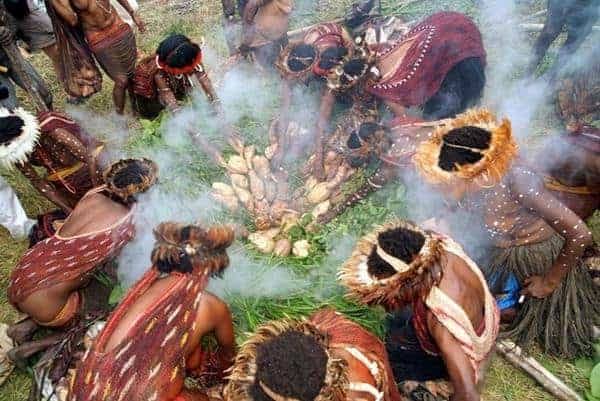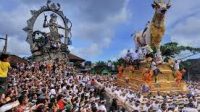KUPASONLINE.COM — Papua is one of the largest provinces in Indonesia and is located in the eastern region of Indonesia. Besides having abundant nature, Papua is also rich in culture and traditions.
Like other regions in Indonesia, Papua is also steeped in hereditary customs and still preserves its traditions to this day.
This tradition, which is still maintained by the Papuan people, includes traditional Papuan ceremonies which are carried out at certain moments. Papuan traditional ceremonies are currently not just ceremonies, but also a tourist attraction for tourists.
So, what are the traditional Papuan ceremonies that are still sustainable today? What is its uniqueness and the philosophy behind it? Check out the various traditional Papuan ceremonies and their philosophy below!
Various Papuan Traditional Ceremonies and Their Philosophy
1. Papuan Traditional Ceremonies: Stone Burning, Ritual Cooking Together
The first Papuan traditional ceremony is the stone burning ceremony which is a form of gratitude for the people of Papua. This ceremony is a tradition, in which the Papuan people carry out a cooking ritual together.
In its development, this stone burning ceremony has different names, such as Barapen in Jayawijaya, Kit Oba Isago in Wamena, and Mogo Gapil in Paniai.
Usually, the stone burning ceremony is performed by inland tribes such as Nabire, Baliem Valley, Central Mountains, Paniai, Bintang Mountains, Yahukimo and Dekai. Historically, the stone burning ceremony for people in the central highlands of Papua is a fast for burning pork.
However, as a form of tolerance, currently the people of Papua do not have to or do not always burn pigs, sometimes they also burn cows, goats and chickens.
The Batu Bakar ceremony is carried out to welcome news of happiness such as the implementation of traditional marriages, births, coronation of tribal chiefs and gathering soldiers when going to war.
Apart from that, the stone burning ceremony is also a symbol of the simplicity that the people of Papua have, who always uphold equal rights, justice, sincerity, cohesiveness, honesty, and sincerity that brings peace.
The stone burning ceremony is called stone burning, because the procession burns stones until the stones are red-hot, then when the stones are hot, then people will pile food on top of them to be cooked until cooked.
2. Papuan Traditional Ceremonies: Planting Sasi, the Traditional Ceremony of Death by the Marind Anim Tribe
The traditional ceremony of planting sasi is a traditional death ceremony that developed in the Merauke Regency area and is carried out by the Marind tribe or the Marind-Anim tribe. The Marind tribe is in the vast plains region of West Papua.
The word anim in the naming of the Marind Anim tribe means male and the word anum means female. The population of this tribe is estimated at 5000 to 7000 inhabitants.
Sasi is a type of wood which is the main medium in this series of traditional death ceremonies. Sasi wood is planted for approximately 40 days after the death of someone in the area. The sasi wood will then be revoked, after reaching the thousandth day it is planted.
The sasi planting ceremony is always carried out by the Marind tribe and has an impact on the results of typical Papuan wood carvings which are well known to foreign countries.
Like the stone burning ceremony, the planting sasi ceremony also has a philosophy or special meaning for the Marind people. The meaning stored in the sasi planting ceremony is as follows.
Typical carvings originating from Papua, symbolizing the presence of the ancestors.
The sasi planting ceremony is a sign of the state of the heart for the community
Papua, for example, is like expressing sadness when someone dies.
As a symbol of the beliefs of the people with special motifs such as animals, humans and plants carved on wood.
As a symbol of beauty in the form of masterpieces and works of art made by the people of Papua and representing memories from their ancestors.
The Papuan people who carry out the sasi planting ceremony believe that carvings on sasi wood have several special meanings, such as the presence of ancestral spirits, a symbol of belief in living things and a symbol of beauty and works of art.
In the process of the Tanam Sasi ceremony, the community will perform a traditional dance called the Gatsi Dance. Gatsi Dance is one of the typical dances of the Marind Tribe.
This Gatsi dance is performed only when the traditional Tanam Sasi ceremony takes place and the ear tusu festival. During the show, the musicians will play a traditional musical instrument called Tifa.
Tifa is a musical instrument that has a shape like a small drum or dogdog. In addition, tifa is also considered very special because it is made t of milk wood. This wood is a hardwood that can only be found in the forest areas of West Papua. Meanwhile, the drum part of the tifa is made from monitor lizard or deer skin which has been processed to produce a musical sound.
3. Papuan Traditional Ceremonies: Wor, Rituals to Ask for Protection
The Wor ceremony is a tradition that has been passed down from generation to generation by the Biak tribe, namely tribes that inhabit various regions in Papua. The Wor ceremony can be interpreted as a traditional ceremony that has a relationship with the religious life of the Biak people, so that all kinds of social life aspects of the Biak people are often colored with Wor.
4. Papuan Traditional Ceremony: Death of the Asmat Tribe
A well-known Papuan traditional ceremony is the death ceremony by the Asmat tribe. The Asmat tribe is one of the tribes that has the largest population in Papua. Apart from being the largest tribe, the Asmat tribe also has several important rituals or ceremonies that are usually performed and one of them is the death ceremony of the Asmat tribe.
The Asmat people usually do not bury the bodies of tribe members who have died. They usually put the corpse on a mortar boat equipped with sago, then the corpse is allowed to flow into the sea leaving the corpse on woven bamboo until it finally decomposes.
After the corpses are left to become bones, then the Asmat people will store them on a tree. While the skull of the corpse will be used as a pillow by his family members. This is done as a form of affection, love from family members left behind.
The death ceremony is carried out by the Asmat people, because the Asmat people believe that death is not a natural thing, but rather a sign of the presence of disturbing evil spirits. Therefore, when someone is sick, Asmat residents will make a fence from nipa palm branches.
This tree made of nipa palm branches aims to drive away evil spirits that roam around the sick person and not approach the person. When that person is sick, people will just stay and crowd around him without giving medicine or food. It was only after the sick person died that the Asmat people would scramble to hug the corpse and roll their bodies out in the mud.
Then the tradition of the death of the Asmat tribe continues as described above.
5. Papuan Traditional Ceremony: Kiuturu Nandauw
In Papua, there are also several important special traditional ceremonies that are usually performed by parents for their children. Children in Papua will usually carry out a series of traditional ceremonies which have become a tradition passed down from generation to generation.
One of them is the Kiuturu Nandauw traditional ceremony or commonly called the Kakarukrorbun traditional ceremony. This traditional ceremony is the first haircut ceremony performed by children when they turn 5 years old.(*)







